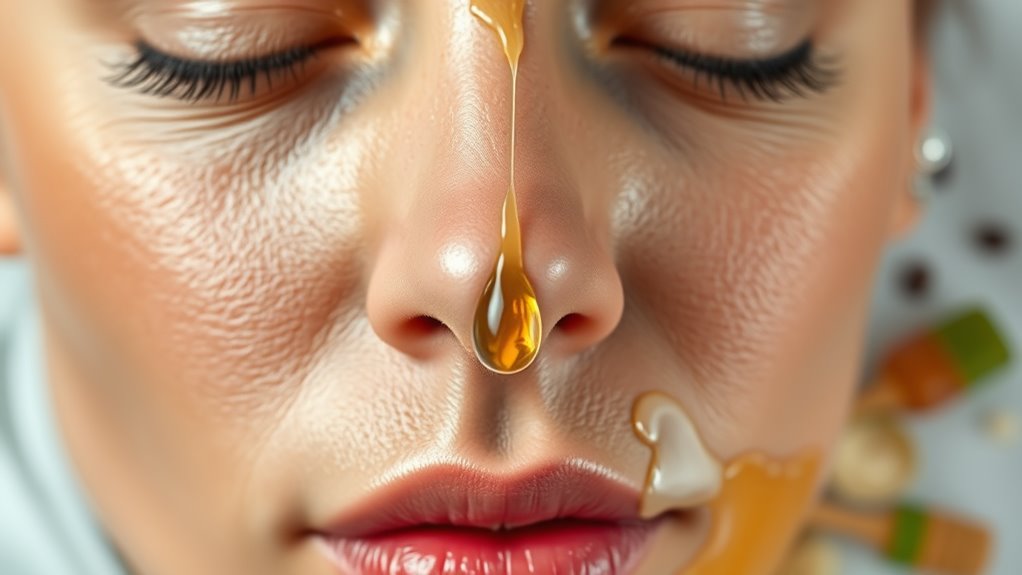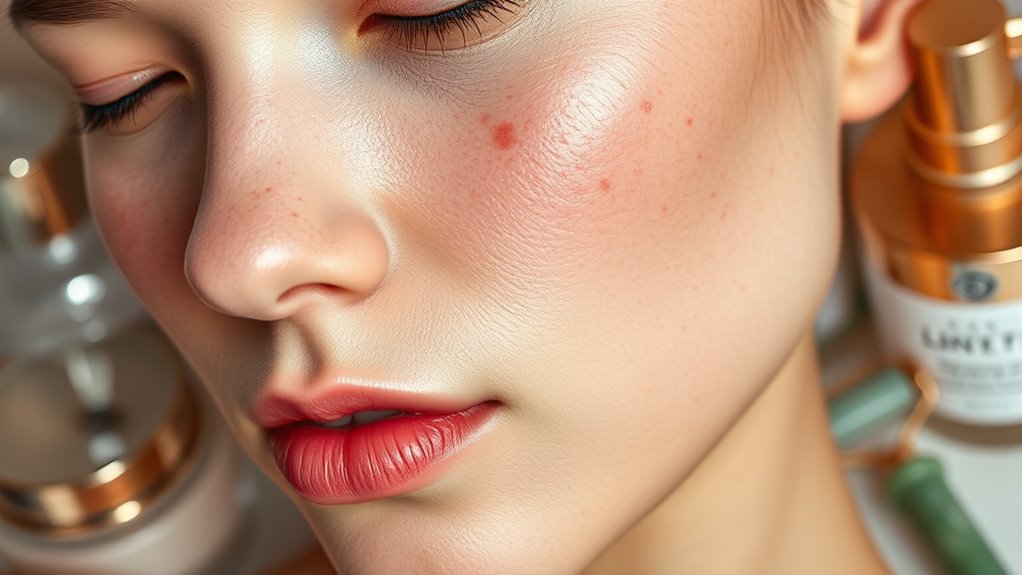How to Calm Red, Irritated Skin Fast
To calm red, irritated skin fast, start by identifying the cause, whether it’s an allergen or irritant. Use a gentle cleanser and avoid hot water. Apply soothing ingredients like aloe vera or chamomile, and consider a cold compress for immediate relief. Don’t forget to hydrate with moisturizers containing hyaluronic acid. Additionally, protect your skin from the sun and make dietary adjustments. There are more effective strategies you can explore for long-lasting results.
Key Takeaways
- Apply a cold compress to the affected area for 10-15 minutes to reduce inflammation and provide immediate relief.
- Use mild, hydrating cleansers and avoid hot water to prevent further irritation and maintain skin moisture.
- Incorporate soothing ingredients like aloe vera or chamomile in your skincare routine for their calming and anti-inflammatory properties.
- Opt for topical treatments containing hydrocortisone or antioxidants to target redness and promote skin repair.
- Make dietary adjustments by including anti-inflammatory foods like fatty fish, berries, and leafy greens to support overall skin health.
Identify the Cause of Redness
Have you ever wondered what causes your skin to become red and irritated? Understanding the triggers is essential for effective sensitive skin relief. Common culprits include allergens, irritants, and environmental factors.
For instance, harsh skincare products can strip your skin of its natural barrier, leading to inflammation. Additionally, conditions like rosacea or eczema can exacerbate redness, often requiring specific treatments.
Stress and diet also play critical roles. You might notice flare-ups after consuming spicy foods or during high-stress periods. Furthermore, soothing strategies can significantly help in alleviating discomfort and restoring your skin’s balance.
Gentle Cleansing Techniques
When dealing with red, irritated skin, using gentle cleansing techniques is essential. You’ll want to choose mild cleansers that won’t strip your skin of its natural oils, avoid hot water that can exacerbate irritation, and remember to pat your skin dry instead of rubbing it. These simple adjustments can significantly improve your skin’s comfort and appearance. Additionally, ensuring that your cleanser is not too harsh can help prevent further irritation and promote healing of the skin’s barrier, which is crucial for maintaining healthy skin.
Choose Mild Cleansers
Choosing the right cleanser is crucial for managing red, irritated skin. You should opt for mild, fragrance-free formulas that won’t strip your skin of its natural oils.
Look for cleansers containing soothing ingredients like aloe vera, chamomile, or calendula, as these can help reduce inflammation. Avoid harsh exfoliants and ingredients like sulfates, which can exacerbate irritation.
Instead, focus on cream or gel-based cleansers that provide hydration while effectively removing impurities. When applying the cleanser, use gentle, circular motions to avoid aggravating sensitive areas.
Avoid Hot Water
Mild cleansers set the stage for effective skincare, but how you cleanse also plays a significant role in calming red, irritated skin. One crucial aspect to consider is water temperature.
Hot water can strip your skin of its natural oils, leading to increased dryness and irritation. Instead, opt for lukewarm water, which gently cleanses without exacerbating inflammation. This temperature helps maintain your skin’s moisture barrier, reducing redness and discomfort.
When washing your face, use your fingertips to apply the cleanser, ensuring even distribution while avoiding excessive pressure. By being mindful of water temperature and applying gentle techniques, you can significantly enhance your skincare routine and promote a more balanced, calm complexion.
Prioritize this practice for optimal skin health.
Pat, Don’t Rub
Gently patting your skin rather than rubbing it can make a significant difference in managing red, irritated skin. Rubbing can exacerbate inflammation and lead to further irritation. By adopting a gentle cleansing technique, you allow your skin to heal more effectively.
Here are some tips to incorporate this method into your routine:
-
Use a soft, clean cloth to gently pat your skin dry after cleansing.
-
Apply products using your fingertips, pressing them into the skin without dragging.
-
Choose a gentle cleanser free from harsh ingredients that can irritate.
-
Avoid using exfoliating tools that require friction, opting instead for chemical exfoliants.
These techniques promote skin health and help maintain a calm, balanced complexion.
Soothing Ingredients to Look For
When choosing products for red, irritated skin, look for natural anti-inflammatory agents that can help reduce redness and soothe discomfort. Ingredients like chamomile and green tea are excellent options, as they calm inflammation while providing antioxidant benefits. Additionally, hydrating components such as hyaluronic acid and aloe vera will help restore moisture and support your skin’s barrier. Incorporating soothing ingredients into your skincare routine can significantly improve the overall appearance and feel of sensitive skin.
Natural Anti-Inflammatory Agents
Natural anti-inflammatory agents play a crucial role in calming red, irritated skin, as they can significantly reduce inflammation and provide soothing relief.
Incorporating these agents into your skincare routine can enhance your skin’s resilience and comfort. Here are some effective natural anti-inflammatory ingredients you should look for:
-
Aloe Vera: Known for its cooling and healing properties.
-
Chamomile: Contains antioxidants that alleviate redness and discomfort.
-
Green Tea Extract: Rich in polyphenols that help reduce inflammation.
-
Turmeric: Its active compound, curcumin, has potent anti-inflammatory effects.
Hydrating Moisturizing Components
To effectively soothe red, irritated skin, incorporating hydrating moisturizing components into your skincare regimen is essential. Look for ingredients like hyaluronic acid, which attracts moisture to the skin, ensuring it remains plump and hydrated.
Glycerin is another excellent choice; it acts as a humectant, drawing water into the skin while creating a protective barrier. Aloe vera is known for its soothing properties and can reduce redness while providing hydration.
Additionally, consider products containing ceramides, which help restore the skin’s natural barrier, preventing moisture loss. Lastly, shea butter offers deep nourishment and hydration, calming irritation.
Cold Compress Application
Applying a cold compress can be an effective way to soothe red, irritated skin. This method helps reduce inflammation and provides immediate relief.
Here’s how to apply a cold compress correctly:
-
Choose the right material: Use a soft cloth or a clean towel.
-
Prepare the compress: Soak it in cold water or wrap ice in a cloth—never apply ice directly to the skin.
-
Application time: Place the compress on the affected area for 10-15 minutes.
-
Frequency: Repeat this process several times a day, as needed.
Hydrating and Moisturizing Formulas
When your skin feels red and irritated, using hydrating and moisturizing formulas can significantly help restore its balance and comfort. These products create a protective barrier, locking in moisture and reducing dryness. Look for formulations containing hyaluronic acid, glycerin, or aloe vera, as they effectively hydrate and soothe the skin. Additionally, incorporating proper hydration techniques into your routine can further alleviate discomfort and enhance your skin’s resilience.
| Ingredient | Benefits |
|---|---|
| Hyaluronic Acid | Attracts moisture to the skin |
| Glycerin | Provides deep hydration |
| Aloe Vera | Calms and soothes irritation |
| Ceramides | Strengthens the skin barrier |
| Squalane | Locks in moisture and nourishes |
Incorporating these ingredients into your skincare routine can promote healing and enhance your skin’s overall appearance. Prioritize consistency for best results.
Anti-Inflammatory Treatments
When dealing with red, irritated skin, anti-inflammatory treatments can provide significant relief. You can explore natural remedies, topical treatments, and dietary choices that help reduce inflammation effectively. Understanding these options will empower you to make informed decisions for your skin’s health. Additionally, recognizing the key symptoms of sensitivity can help you determine the most appropriate course of action for your skin concerns.
Natural Remedies Overview
Natural remedies offer a range of anti-inflammatory treatments that can effectively soothe red, irritated skin.
By incorporating these natural solutions into your skincare routine, you can promote healing and reduce discomfort without harsh chemicals.
Consider the following options:
-
Aloe Vera: Known for its cooling properties, aloe vera gel can hydrate and calm inflamed skin.
-
Chamomile: This herb has anti-inflammatory effects and can be applied as a tea compress for relief.
-
Green Tea: Rich in antioxidants, green tea can help reduce redness and irritation when applied topically.
-
Honey: With natural antibacterial properties, honey can soothe and heal irritated skin while providing moisture.
Implementing these remedies may yield significant improvements in the appearance and feel of your skin.
Topical Treatments Explained
Topical treatments play a crucial role in managing red, irritated skin, providing targeted relief through their anti-inflammatory properties. Products containing ingredients like hydrocortisone, aloe vera, or chamomile can effectively soothe inflammation and reduce redness.
When selecting a topical treatment, look for formulations specifically designed for sensitive skin to minimize further irritation. Additionally, consider creams or gels with antioxidants, such as vitamin C or E, which can enhance skin repair.
Applying these treatments regularly, especially after cleansing, ensures you’re maximizing their benefits. Always patch-test new products to prevent adverse reactions, and consult a dermatologist if irritation persists.
Mastering these topical applications can help you regain your skin’s comfort and appearance efficiently.
Dietary Anti-Inflammatory Choices
Incorporating anti-inflammatory foods into your diet can significantly impact the health of your skin, especially when dealing with redness and irritation.
By choosing the right nutrients, you can help reduce inflammation and promote a clearer complexion.
Consider adding these powerful foods to your meals:
-
Fatty Fish: Rich in omega-3 fatty acids, they help reduce skin inflammation.
-
Berries: Packed with antioxidants, they combat oxidative stress on the skin.
-
Leafy Greens: High in vitamins and minerals, they support overall skin health.
-
Turmeric: Its active compound, curcumin, has potent anti-inflammatory properties.
Avoiding Irritants and Allergens
While it may seem challenging to identify the specific irritants and allergens affecting your skin, taking proactive steps is crucial for managing redness and irritation.
Start by evaluating your skincare products, as fragrances, alcohol, and harsh chemicals can exacerbate sensitivity. Transition to hypoallergenic and non-comedogenic options that suit your skin type.
Additionally, observe environmental factors—changes in weather, pollution, or exposure to certain fabrics might trigger reactions. If you suspect specific food allergies, consider an elimination diet under professional guidance.
Remember to maintain a clean environment, as dust and pet dander can also irritate your skin.
The Role of Sun Protection
Because sun exposure can significantly worsen red, irritated skin, prioritizing sun protection is essential for maintaining your skin’s health.
To effectively protect your skin, consider the following strategies:
-
Use broad-spectrum sunscreen****: Choose a sunscreen with SPF 30 or higher to shield against UVA and UVB rays.
-
Reapply regularly: Apply every two hours, or more often if you’re sweating or swimming.
-
Wear protective clothing****: Lightweight, long-sleeved shirts and wide-brimmed hats can offer additional defense.
-
Seek shade: Whenever possible, stay in shaded areas, especially during peak sun hours (10 a.m. to 4 p.m.).
Dietary Considerations for Skin Health
Maintaining a healthy diet can play a significant role in soothing red, irritated skin. Focus on incorporating anti-inflammatory foods, such as fatty fish, walnuts, and flaxseeds, which provide omega-3 fatty acids. These nutrients can help reduce inflammation and promote skin healing.
Include a variety of colorful fruits and vegetables rich in antioxidants, like berries and leafy greens, to combat oxidative stress. Staying hydrated is equally crucial; aim for adequate water intake to maintain skin moisture.
Limit processed foods, sugar, and dairy, as they may exacerbate skin issues for some individuals. By prioritizing a nutrient-dense diet, you’ll support your skin’s health and resilience, creating a more balanced and radiant complexion.
Stress Management Strategies
To effectively manage stress, which can significantly contribute to skin irritation, you’ll want to adopt strategies that promote relaxation and emotional balance.
Implementing these techniques can help you regain control and reduce inflammation:
-
Mindfulness Meditation: Practice focusing on the present moment to alleviate anxiety and tension.
-
Regular Exercise: Engage in physical activity to release endorphins, which boost mood and reduce stress levels.
-
Deep Breathing Exercises: Incorporate deep, controlled breaths to lower heart rate and promote calmness.
-
Adequate Sleep: Prioritize restful sleep, as lack of sleep can exacerbate stress and negatively impact your skin.
When to Seek Professional Help
When should you consider seeking professional help for red, irritated skin? If your symptoms persist beyond a few days despite home treatment, it’s time to consult a dermatologist.
Additionally, seek help if you notice severe swelling, blistering, or any signs of infection, such as pus or fever.
Persistent redness accompanied by dryness or peeling could indicate an underlying condition like eczema or rosacea, warranting professional evaluation.
If over-the-counter products worsen your symptoms, don’t hesitate to reach out for expert guidance.
Lastly, if your irritated skin affects your daily life or self-esteem, a specialist can provide tailored solutions and effective treatments to restore your skin’s health and confidence.
Prioritize your skin’s well-being—expert advice is invaluable.




